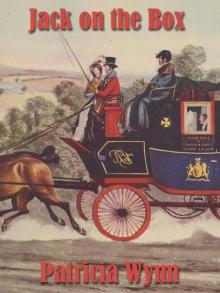- Home
- Patricia Wynn
Jack on the Box Page 2
Jack on the Box Read online
Page 2
Finally, on one particular occasion, when Jack was asked for the reins, his thoughts flew to that day’s complement of passengers. There was an older woman who had given him a sweetly confiding smile upon mounting the steps, and a younger, nervous one with a newborn baby in her arms. So, on that occasion, Jack had smiled his winning smile and simply said no.
Three months were passed in this way without a major incident and Jack could be proud of his record. He was surprised to find that he did not miss the amusements of a gentleman’s life, although there were days when a warm bath and the attentions of a valet would have been quite welcome. In fact, he settled rather quickly into the rhythm of his work and began to feel that there were advantages to being employed that he might never have realized if his father had not disowned him, however temporarily. From time to time he did wonder just when Sir Geoffrey would decide that he was worthy to be called his son again. But mail coachmen led a lordly life, after a fashion, for they were the kings of the road. All other traffic gave way for the mail, and it was the Royal Mail that carried the news of military victory to the provinces. All eyes would turn to see whether the coach carried the green laurels to signal another victory against Napoleon, and Jack was proud to be the herald of the Crown. He was not particularly eager to return to his old way of life.
It was in this happy frame of mind one morning at dawn that Jack pulled up in front of the inn in Shipston and espied a rather unusual customer.
Chapter Two
She was clearly a lady, as he could tell by the elegance of her traveling costume, but she was unaccompanied by either governess or maid. She was small, with a slight, pleasant figure, cloaked in a cashmere wool redingote after the fashion of a few years back, and her curly, chestnut-coloured hair beneath a coal-scuttle bonnet was becomingly cut à la Titus. As Jack hopped down from the box to receive his passengers, she approached him, anxiously clutching her reticule.
“Is this the London to Birmingham mail?” she asked.
Jack touched his forelock to her with respect. “Yes, miss. Are you meeting someone?”
“No . . .” She flushed unexpectedly. “I tried to purchase a token, but the man in the booking office said there were no more places to be had.” She gave Jack a tentative look, as if hoping he would prove the man wrong.
It went sorely against his inclination to disappoint her, but he had to shake his head. “Then I’m sorry, miss. If the seats are all taken, then I’m afraid you’ll have to wait for the next coach, or take the stage.” Jack regretted these words as soon as he said them, for her eyes, which had held a small gleam of hope, seemed to fade. There was something about her, despite her small size, which suggested pluck, and it seemed to Jack that she was a person who would face any problem head on. The lines of her face gave a hint of a happy temperament and a lively intelligence, but at the moment there was a droop to her shoulders, which did not seem to belong. His answer had evidently disheartened her, although something in the resignation with which she received it informed him that she was used to disappointment.
She mused for only a moment before giving him a measuring look. He liked the clearness of her gaze.
In a voice barely above a whisper, she asked, “Could you possibly find me a place upon the roof if I pay you my passage? I will be happy to give you full fare.”
Jack suppressed a smile at this inexpert attempt to bribe him. He had to admire her courage in pursuing the matter, for he was a total stranger to her. What possibly could have happened to make her venture on a lonely trip on the mail, he wondered, when she appeared to be a lady who would travel in her own coach or private chaise.
With a fear of Davies’s disapproving reaction in mind, Jack started to tell her of the company’s rule against allowing more than three passengers upon the roof, but as he opened his mouth to speak, something in her face arrested him. The young lady was gazing up at him, if not with desperation then with something very close, still clutching her reticule tightly with both hands. Something serious was disturbing her, and sufficiently so for her to need a faster means of travel than the stage.
A cry from Davies alerted him that the coach was ready, and he must hasten. Gazing into her pleading eyes, Jack made a quick decision.
He gave her a wink, and was amused by the momentary shock that registered in her face. Speaking loudly for the benefit of the people in the booking office, he said, “I’m quite sorry, miss, but this coach is full. You had better purchase a place in the next.”
She gave him an uncertain look, but her face lit up, as he added in a hurried whisper, “I can give you a seat on the box, but I can’t take you up here. If you’ll give me your bags and walk to the edge of town, I will stop for you there. I’ll be there in less than two minutes!”
Her eyes sparkled with sudden relief. “Thank you,” she said in an answering whisper. “But you do not need to bother about my bags. They can follow me later.”
With a quick smile, she turned and hastened up the street, leaving Jack to wonder how Davies would react to this serious breech of the rules.
Once the coach was loaded with its full complement of passengers, Jack drove the horses down the few blocks to the end of town and pulled them up. A young gentleman from Oxford had secured the box seat by paying a judicious tip to the ostler. He looked at Jack questioningly as the horses stopped and the young lady stepped up to the wheel.
“Sorry, old fellow,” Jack told him, “but I must appeal to you as a gentleman to relinquish your seat to this lady. Her mother is ill, and she must catch this mail to arrive at her side as quickly as possible.”
The young man tipped his hat to the fair usurper, but spoke as one who must reluctantly point out the obvious. “I should be delighted, of course, but all the seats on the roof are bespoken.”
Jack peered behind him as if only now aware that such was the case. “I see—yes—you are quite right,” he mused aloud. “That does present a problem.” He turned back to the gentleman and looked him over gravely. “Sir, may I trust you to ride on the rear of the roof near the guard? It is against postal regulations, as you know, but in this instance I think an exception could be made.”
The young man eagerly assured him that he could be trusted, saying that nothing would be further from his mind than robbing His Majesty’s Mail, if only he might take one shot at a rabbit with the guard’s blunderbuss. Hiding a smile, Jack assured him, with perfect untruth, that he was certain Davies would be delighted to oblige, if the young gentleman would only climb to the rear and explain the situation to him.
Overjoyed by the prospect of this rare privilege, the passenger hastened to assume the forbidden seat, despite the grumblings of the three on the roof as he stumbled past them. Davies had been standing while this transaction took place, waiting with a patient frown for Jack to resume the journey. The young man spoke to him in rapid undertones, and to Jack’s intense relief, Davies merely gave him a sardonic grimace before settling himself again on his perch.
Silently hoping that his exemplary behaviour to date had purchased him the right to this one transgression, Jack jumped to the ground to hand his gentle passenger up onto the box.
But the stopping of the coach had alerted the people inside to the fact that something unusual was taking place. One woman in particular took offense at the sight of the lady waiting below. Sticking her red, pox-marked face out the window, she defied Jack to let “that creature” aboard.
The young lady glanced worriedly up at him and, in the face of the woman’s assault, seemed to be questioning the wisdom of the step she was about to take. But her hesitation lasted no more than a moment. As soon as she saw Jack’s reassuring smile, she straightened her small shoulders and, accepting the use of his arm to help her mount, climbed upon the wooden seat.
Jack could see that she was unaccustomed to such abuse, and he admired the self-possession which had led her to ignore it. He, however, had to answer to all of his passengers. So, suppressing a sigh of annoyance at the torrent o
f slander continuing to emanate from the coach, he walked back to deal with the discontented woman.
“I shall have you reported to the authorities,” she threatened as he approached the door.
Jack smiled and addressed her with a marked degree of deference. “I encourage you to do so, madam. It troubles me to offend you in any way, but as I can see it, there is only one solution. I feel obliged to help the lady, who is on the way to her mother’s deathbed and cannot find any means to get there quickly on her own. I would have asked one of you to give up your seat, but I did not wish to cause you any inconvenience.”
Startled by the thought that they might be asked to give up their seats, the other passengers retired willingly from the fray. The red-faced woman seemed mollified by Jack’s unusual courtesy, but she was not entirely ready to abandon all appearance of offense.
“That’s is as may be,” she pronounced in virtuous tones, “but how are we to know you’ll keep your mind on the road—a lusty young fellow like yourself, with a girl up beside him?”
Jack felt all the justness of her remark as he recalled the lady’s attractive appearance. It had been a long time, he reflected, since he had been in the company of a lady. But he did not reveal his feelings to the irate passenger. He merely bowed to the surprised woman with an exaggerated flourish.
“There, now, madam, you’ve discovered my reason for not asking you to sit on the box beside me,” he said.
The other passengers greeted this sally with hoots of laughter, and the red-faced woman turned an even deeper shade of red. But she was far from displeased to receive a compliment from such a handsome, well-spoken young man. She waved Jack away with a muffled, “Go on with you now!” and remarks to her fellow passengers about his sauciness to a woman of her years.
Jack remounted the box and glanced at his companion. He could tell by her heightened colour that she had heard his exchange with the woman and was trying to appear as if she had not. But Davies blew impatiently on his horn, so with no more than a respectful tip of his hat to the lady beside him, Jack took up the reins and started off once again.
From time to time, he stole a look at his companion’s profile. She was so small that her feet did not reach the footboard, and she was obliged to hold on tightly with both hands as Jack drove the coach rapidly around corners to make up for the time he had lost. Soon they were out in the country and traveling at a more even pace where the road was straighter, and she could relax her hold.
“I hope you will not have any reason to regret taking me up,” she ventured after a while. “I only need to go as far as Hockley Heath, so you may let me down there. Shall I give you the fifteen shillings now?”
Jack laughed. “You might offer them to the young gentleman for giving up his seat to you,” he said, jerking his head towards the rear of the coach. “But I think he is even better pleased to be riding illegally in the back than he was in front. And I make it a practice not to charge ladies who ride upon my box.”
He could feel her start at his answer. But he kept his gaze on the road in front of him, and his serious tone must have reassured her, for she thanked him with polite composure.
They rode for a while in silence. Jack was conscious of her skirt brushing against his leg, though she was seated as far from him as the seat would allow. He found himself wishing that she would speak to him again. He was curious, too, about why she needed to travel so urgently, but his sense of discretion would not allow him to question her, even if she knew him as Mr. Jack Henley. His current occupation was an even greater barrier to such a liberty.
Presently, he risked another glance in her direction. She was smiling in quiet contentment as she gazed about the countryside, seemingly free of that earlier anxiety. Whatever had caused her to flee in haste appeared to have been dismissed from her mind.
The breeze, which was made by the speed of the coach, played with the curls that peeked from beneath her bonnet. Her eyes were alight with enjoyment, and her small feet swung with each bounce of the coach to tap against the wooden foreboot beneath the box. Jack was happy to see that his initial assessment of her character had been correct. She was indeed a good-natured lady with a lively disposition. The glow of enthusiasm in her cheeks inspired him with a rare sense of pleasure. Her carefree air awoke a strange elation in him.
She must have sensed his eyes upon her, for she suddenly directed him a question.
“What is this kind of coach called?” she asked. “Is it the Highflyer?”
“No, that’s a name for one of the stagecoaches,” he said, with a mixture of amusement and authority. “This is a patent coach, with a telegraph spring.”
“It feels like a telegraph, it moves so quickly,” she said. “With my feet dangling in the air and the smooth bounce it gives, I feel as if I’m flying. Your coach is very well sprung,” she concluded approvingly. “I shall have to tell my grandfather.”
Jack smothered a laugh. He knew she had intended the remark as a generous compliment. “Thank you, miss,” he said gravely. “Is your grandfather a coaching gentleman?”
“Not any more,” she said, with a hint of sadness. “But there was a time when he was quite good with the ribbons. He once raced from Maidenhead to Ascot in thirty-five minutes,” she added proudly.
“That’s an excellent time,” Jack declared, in his enthusiasm forgetting to restrain his conversation. “I doubt I could do it faster myself.”
“Oh, grandpapa had quite a reputation. He was an active member of the Benson Driving Club until quite recently. He used to take me up beside him on the box when I was only a baby, though my mother tried to prevent him.”
Hearing this, Jack reckoned that her childhood experiences would explain her present sense of ease on the jolting box. He found it easy to picture her as a little girl holding on tightly and laughing with delight.
“Any gentleman would be proud to have you sitting beside him,” he said, without thinking, “with your pretty curls and your smile.”
The young lady eyed him in sudden dismay, and Jack’s heart sank as he realized the mistake he had made. She turned away, but not before he saw the nervous reproach in her eyes. He felt his face colour in vexation as he, too, returned his gaze to the road.
He cursed himself silently. How could he have been so stupid! The remark itself had not been so offensive. It was certainly no more—probably less—flirtatious than anything he might have said to a lady friend in London in similar circumstances. But this lady clearly thought she had been insulted by a servant of the Birmingham mail! And why shouldn’t she, he reflected, for who else should be driving this coach?
He clenched his jaw and unconsciously tightened his grip upon the reins. For the first time these three months, Jack realized that his father had indeed imposed a punishment when he had sent him to work for the mail. His mind wandered, as he pondered whether he ought to apologize to the young lady or just allow the matter to drop. He considered explaining his own circumstances to her by way of explanation for his forwardness, but it suddenly occurred to him that she might very well not believe him. He tightened his hands even more on the reins.
Jack was so preoccupied by his embarrassment that he did not notice when the horses began to object to his unaccustomed treatment. They tossed their heads, trying to loosen the hold upon them. Alarmed by his tension, they began to pick up their pace.
Suddenly, one of the leaders tripped, pulling sharply upon the left rein, which must have been worn in one spot, for it broke in two with a snap. Instantly, the unguided and frightened horse began to run and the carriage was propelled with a powerful jerk. The other leader became alarmed. Bound to the frightened horse by its coupling reins, it attempted to follow, but it was held in check by the pressure of Jack’s hold on the reins.
The unbalanced situation caused the coach to sway back and forth as the loose lead horse kept trying to kick his traces. Jack pulled on the reins that were still intact, fighting to regain control of the terrified animals. But his
companion, with no foothold to support her, was tossed dangerously to left and right. Suddenly, her grip broke and she was thrown abruptly against Jack’s side.
He quickly dropped the reins from one hand and caught her about the waist before she could be flung from the box, but with his arm about her he could not manage to regain his grip. The reins for the right pair of horses flapped beyond his reach. There was nothing he could do but pull with his left hand with all his might as the horses careened wildly down the road. The brake stood at his side, but without a free hand Jack was helpless to avail himself of it. The muscles in his left arm strained against the weight of the horses. He called to them to “Whoa!” while the passengers’ screams filled his ears.
Finally, just as he was certain that he could not hold on much longer, the horses tired and began to slow. He called to them reassuringly and his soothing tone began to take effect. Even though the coach still swayed with the uneven slowing of the loose horse versus the others, he eventually managed to bring it to a halt near a grove of oaks.
Slowly releasing his bruised and bleeding fingers from the leather straps, he sighed and, closing his eyes, leaned against the hard rail of the seat. It was only then that he became aware that he was still grasping his tiny passenger firmly by the waist. He had been holding her so tightly, and she was so small, that she was practically sitting on his lap. She nearly sat astride his right leg, her feet dangling about his ankles, until abruptly, as if just now aware her awkward position, she pushed at his arm and struggled to resume her place.
Giving her a hand to help her back onto her seat, Jack tried to swallow his chagrin. A different, more disturbing emotion made his heart beat strangely when she turned embarrassed eyes on him in a fleeting glance.
“I hope you weren’t injured in any way, miss,” Jack said humbly, his voice husky with fatigue. He meant to avert his gaze to spare her further disquiet, but for some inexplicable reason found it impossible to take his eyes off her. The young lady, however, had recovered more quickly than he, for even though her discomfiture was still perceptible, she managed to incline her head in a queenly, condescending manner.

 The Bumblebroth
The Bumblebroth The Birth of Blue Satan
The Birth of Blue Satan Jack on the Box
Jack on the Box Sophie's Halloo
Sophie's Halloo Mistletoe and Mischief
Mistletoe and Mischief The Christmas Spirit
The Christmas Spirit The Spider's Touch
The Spider's Touch A Country Affair
A Country Affair A Pair of Rogues
A Pair of Rogues